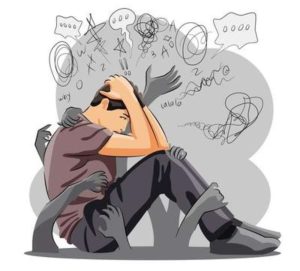Depression, clinically known as major depressive disorder (MDD), is a common but serious mood disorder that affects how a person feels, thinks, and handles daily activities. It can lead to a persistent feeling of sadness or a lack of interest in activities that were once enjoyable. Depression is more than just a temporary feeling of sadness; it can significantly impair a person’s ability to function in their daily life, affecting work, relationships, and overall well-being.

A family history of depression can increase the likelihood of developing the disorder.
Imbalances in neurotransmitters, such as serotonin and norepinephrine, can affect mood regulation.
Traumatic events, chronic stress, or significant life changes can trigger depressive episodes.
Chronic illnesses, hormonal changes, or certain medications can also contribute to the onset of depression.
Treating depression typically involves a combination of medication, therapy, and lifestyle changes. Here are the main approaches to managing the condition:
-Antidepressants are often prescribed to help regulate mood. Common classes of antidepressants include selective serotonin reuptake inhibitors (SSRIs), serotonin-norepinephrine reuptake inhibitors (SNRIs), and atypical antidepressants. These medications can take several weeks to show effects, and it may take time to find the right medication and dosage for each individual.
– Encouraging a healthy lifestyle can significantly impact mood and overall mental health. Regular physical activity has been shown to improve mood, reduce anxiety, and alleviate depressive symptoms. A balanced diet rich in omega-3 fatty acids, whole grains, fruits, and vegetables can also support mental health.
-Cognitive Behavioral Therapy (CBT) is one of the most effective forms of therapy for depression. It focuses on identifying and changing negative thought patterns and behaviors that contribute to depressive symptoms. Other therapeutic approaches, such as interpersonal therapy (IPT) and psychodynamic therapy, can also be beneficial.
– Practices such as mindfulness meditation, yoga, and deep breathing exercises can help reduce stress and promote a sense of well-being. These techniques can be integrated into daily routines to help individuals manage their symptoms.
– Participating in support groups can provide individuals with a sense of community and understanding. Sharing experiences with others facing similar challenges can foster connection and reduce feelings of isolation.
– For treatment-resistant depression, options such as electroconvulsive therapy (ECT) or transcranial magnetic stimulation (TMS) may be considered. These treatments can provide relief for individuals who do not respond to conventional therapies.
Recognizing and treating depression is essential for improving the quality of life for those affected. A comprehensive approach that includes medication, therapy, lifestyle changes, and support can help individuals manage their symptoms effectively. With the right treatment and support, recovery is possible, enabling individuals to lead fulfilling lives. If you or someone you know is struggling with depression, it is crucial to seek help from a healthcare professional.
A4 Clinics is a chain of clinics that provides advanced technology-enabled rehabilitation for patients with BRAIN DISEASES. This is the brain-child of Dr. Abha Agrawal, MD, FACP, FACHE (USA).
Copyrights © 2015-2025 All Rights Reserved by A4 Clinics Pvt. Ltd.